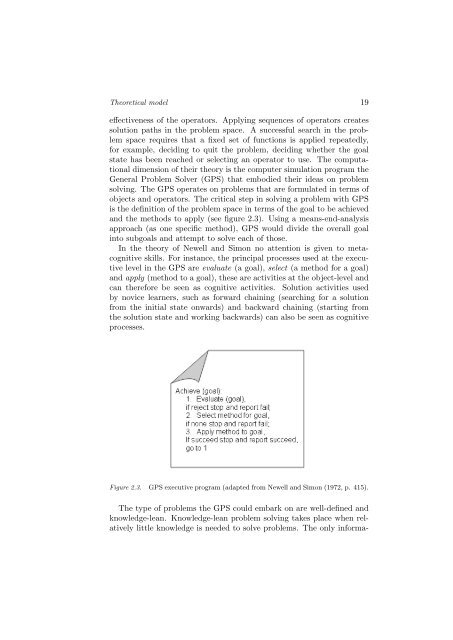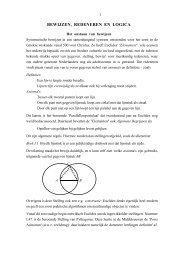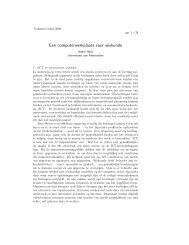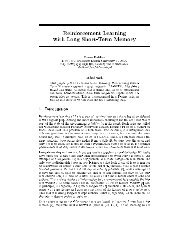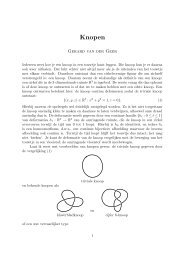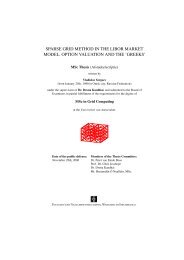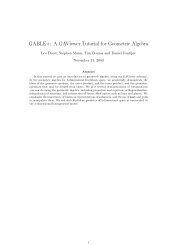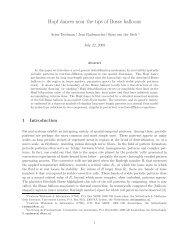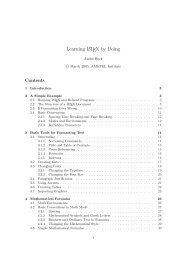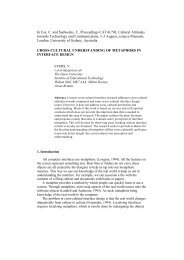The role of metacognitive skills in learning to solve problems
The role of metacognitive skills in learning to solve problems
The role of metacognitive skills in learning to solve problems
Create successful ePaper yourself
Turn your PDF publications into a flip-book with our unique Google optimized e-Paper software.
<strong>The</strong>oretical model 19<br />
effectiveness <strong>of</strong> the opera<strong>to</strong>rs. Apply<strong>in</strong>g sequences <strong>of</strong> opera<strong>to</strong>rs creates<br />
solution paths <strong>in</strong> the problem space. A successful search <strong>in</strong> the problem<br />
space requires that a fixed set <strong>of</strong> functions is applied repeatedly,<br />
for example, decid<strong>in</strong>g <strong>to</strong> quit the problem, decid<strong>in</strong>g whether the goal<br />
state has been reached or select<strong>in</strong>g an opera<strong>to</strong>r <strong>to</strong> use. <strong>The</strong> computational<br />
dimension <strong>of</strong> their theory is the computer simulation program the<br />
General Problem Solver (GPS) that embodied their ideas on problem<br />
solv<strong>in</strong>g. <strong>The</strong> GPS operates on <strong>problems</strong> that are formulated <strong>in</strong> terms <strong>of</strong><br />
objects and opera<strong>to</strong>rs. <strong>The</strong> critical step <strong>in</strong> solv<strong>in</strong>g a problem with GPS<br />
is the def<strong>in</strong>ition <strong>of</strong> the problem space <strong>in</strong> terms <strong>of</strong> the goal <strong>to</strong> be achieved<br />
and the methods <strong>to</strong> apply (see figure 2.3). Us<strong>in</strong>g a means-end-analysis<br />
approach (as one specific method), GPS would divide the overall goal<br />
<strong>in</strong><strong>to</strong> subgoals and attempt <strong>to</strong> <strong>solve</strong> each <strong>of</strong> those.<br />
In the theory <strong>of</strong> Newell and Simon no attention is given <strong>to</strong> <strong>metacognitive</strong><br />
<strong>skills</strong>. For <strong>in</strong>stance, the pr<strong>in</strong>cipal processes used at the executive<br />
level <strong>in</strong> the GPS are evaluate (a goal), select (a method for a goal)<br />
and apply (method <strong>to</strong> a goal), these are activities at the object-level and<br />
can therefore be seen as cognitive activities. Solution activities used<br />
by novice learners, such as forward cha<strong>in</strong><strong>in</strong>g (search<strong>in</strong>g for a solution<br />
from the <strong>in</strong>itial state onwards) and backward cha<strong>in</strong><strong>in</strong>g (start<strong>in</strong>g from<br />
the solution state and work<strong>in</strong>g backwards) can also be seen as cognitive<br />
processes.<br />
Figure 2.3. GPS executive program (adapted from Newell and Simon (1972, p. 415).<br />
<strong>The</strong> type <strong>of</strong> <strong>problems</strong> the GPS could embark on are well-def<strong>in</strong>ed and<br />
knowledge-lean. Knowledge-lean problem solv<strong>in</strong>g takes place when relatively<br />
little knowledge is needed <strong>to</strong> <strong>solve</strong> <strong>problems</strong>. <strong>The</strong> only <strong>in</strong>forma-


